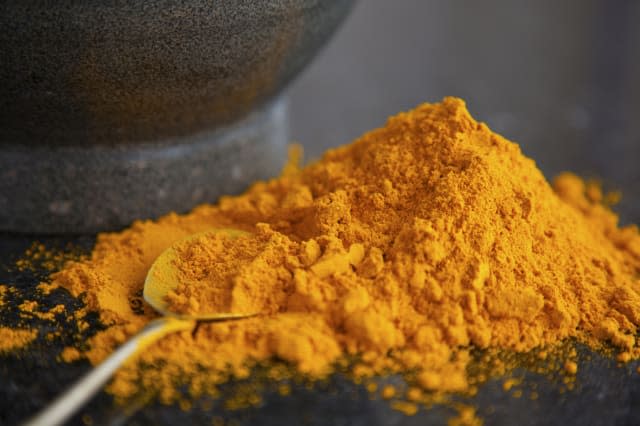Seven health benefits of turmeric, according to science

pic
You might know that turmeric, the spice that gives curry its yellow colour, may help to prevent Alzheimer's disease - but did you know that it has a host of other health benefits too? Here are seven reasons why you should consider adding it to your diet.
See also: Eight foods that fight aches and pains
See also: Six surprising things that increase dementia risk
1. Good for reducing inflammation
Inflammation plays an important role in the body, helping to combat foreign invaders and repairing damage. Long-term, however, inflammation can be a bad thing. Scientists believe that low-level inflammation contributes to a host of chronic diseases, including heart disease, cancer and Alzheimer's disease.
The good news is that turmeric has been shown to reduce inflammation in the body. In some studies, curcumin (the main active compound in turmeric) proved just as effective as anti-inflammatory medication – and without the side effects.
2. A powerful antioxidant
Antioxidants play an important part in the body, helping to protect the body from free radicals which cause ageing and various diseases. As well as being a powerful antioxidant itself, curcumin also stimulates the body's own antioxidant enzymes – helping it further in the fight against free radicals.
3. Good for the brain
Studies show that taking a high dose of curcumin can help to increase levels of Brain-Derived Neurotrophic Factor (BDNF), a type of growth hormone which stimulates the growth of new neurons in the brain and helps protect against various degenerative processes.
People with depression and Alzheimer's disease tend to have low levels of the hormone. Recent research has offered some promising results, suggesting that increased levels of BDNF can help to delay and even reverse some brain diseases and help to slow age-related cognitive decline.
4. Helps prevent heart disease
Curcumin is known to improve the lining of blood vessels in the body, which in turn, can help to regulate blood pressure and prevent blood clotting.
One study suggested that curcumin works as well as the cholesterol-lowering drug Atorvastatin. As well as improving the lining of blood vessels, curcumin reduces inflammation and oxidation, both of which are factors for heart disease.
5. May protect against cancer
There have been a number of studies into the benefits of turmeric to prevent and treat cancer. Research shows that the spice can affect cancer growth, development and spread at the molecular level in the laboratory. Scientists are now investigating whether it could help to treat cancer in humans.
So far, results have proved positive. One study found that taking 4 grams of curcumin per day for 30 days reduced the number of potentially pre-cancerous colon lesions by 40%. A separate study found that turmeric may switch off a gene mutation which is a pre-cursor to cancer.
6. Could help prevent Alzheimer's disease
Scientists have long been aware that elderly people in India have low rates of Alzheimer's disease, and one reason may be that they consume a lot of turmeric in their diets. One 2009 study found that eating turmeric foods at least twice a week may lower your risk of Alzheimer's disease and dementia.
As well as helping to reduce inflammation and oxidative damage – both of which play a key role in Alzheimer's disease – turmeric has another important ability. Scientists say that curcumin can help to clear Amyloid plaques, a build-up of which is a key feature of Alzheimer's disease.
7. May reduce arthritis symptoms
Because of its anti-inflammatory properties, curcumin can be of particular benefit to arthritis sufferers. One study found that curcumin was just as good as Ibuprofen when it came to relieving painful knees in those suffering from osteoarthritis. Another study found that curcumin was better at reducing pain and swelling in patients with rheumatoid arthritis than the commonly prescribed drug diclofenac.
How much to take?
Turmeric contains a number of medicinal compounds, known as curcuminoids, the most important of which is curcumin. However, turmeric only contains around 3% of curcumin by weight – and it would be near-impossible to eat enough of the spice in order to consume the same amount as used in many of the studies mentioned.
Instead, you need to take a curcumin supplement. As the body isn't good at absorbing curcumin, look for a supplement that also contains piperine. This natural substance found in black pepper enhances the absorption of curcumin by around 2,000 per cent. Some people swallow a few whole peppercorns along with a curcumin supplement. To boost absorption even more, it can help to take curcumin with a fatty meal.
Whichever supplement you choose, follow the guidelines on the packaging carefully. Taking very high doses over a long period has been associated with liver damage. You shouldn't take curcumin if you have gall bladder disease.
A recent experiment by Dr Mosley found that eating a teaspoon of turmeric a day for six weeks (preferably with food) has health benefits. You can read more about his findings here.



